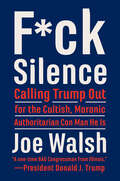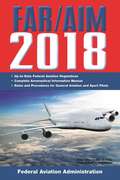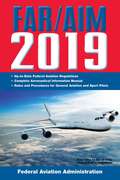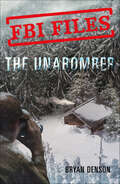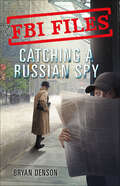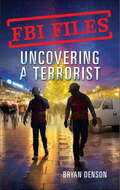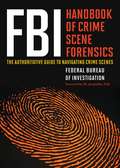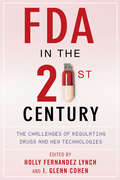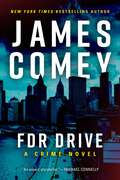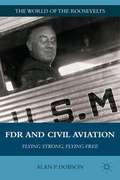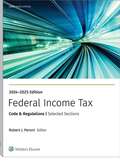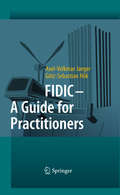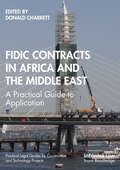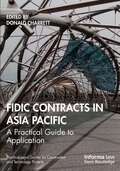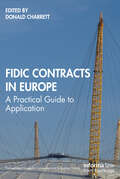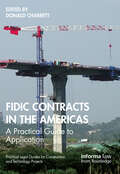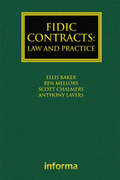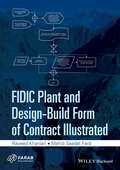- Table View
- List View
F*ck Silence: Calling Trump Out for the Cultish, Moronic, Authoritarian Con Man He Is
by Joe WalshFormer congressman and conservative talk radio host Joe Walsh reveals why Donald Trump is the exact threat our Founding Fathers feared in F*ck Silence.Joe Walsh is as rock-ribbed a conservative as they come. But he believes that no right-wing policy victory is worth the loss of our very democracy.In this clear-eyed and unsparing book, Walsh makes the case that Trump has more in common with the foreign dictators he praises publicly than a predecessor like Ronald Reagan. Trump is an existential threat to conservatism, the presidency, and national unity. He has violated the Constitution in plain sight, assaulted democratic institutions, overwhelmed the country with disinformation, erected around himself a cult of personality, and governed according to his narcissism more than any discernable political philosophy.Though Walsh agrees with Trump that the Washington elite has hung working-class America out to dry, traveling down the road to despotism is no response. And a person who placed himself above the rule of law and accountability sat in the Oval Office—missing only a big, beautiful throne behind the Resolute Desk.In F*ck Silence, Walsh challenges his countrymen, especially his fellow conservatives, to acknowledge and oppose this unpatriotic and un-American behavior before we give away what made America great in the first place: our democracy.“Joe Walsh is like no one else in American politics today: a fire-breathing conservative born again hard in the era of Trump . . . F*ck Silence is pure Walsh—raw, real, and unfiltered as hell. He owns his past and speaks truth to Trump with a clear voice and an extended middle finger.” —#1 New York Times–bestselling author Rick Wilson
FAR AMT 2018: Federal Aviation Regulations for Aviation Maintenance Technicians
by Aviation Academics Inc. StaffAMT references include some of the most often used FAA Advisory Circular publications and FAA Orders, which makes this the most comprehensive regulations book available for aviation technician and repair centers.
FAR/AIM 2017: Federal Aviation Regulations / Aeronautical Information Manual (Far/aim Ser.)
by Federal Aviation AdministrationLearn to fly a plane according to Federal Aviation Administration (FAA) regulationsThe most complete guide to the rules of aviation accessible anywhere Contains all of the information needed to operate safely in US airspace and is fully updatedIf you are an aviation enthusiast or an aviator, you need to have the newest edition of the FAR/AIM. In the most recent edition of the FAR/AIM, produced by the FAA, all procedures, illustrations, and regulations are up-to-date and reflect current FAA data. Learn about takeoffs and landings, land navigation, how to aid climb, world flight patterns, flying rolls, academic liftoff, and more. This useful reference book is a critical resource for all members of the aviation community, including aspiring pilots seeking a concrete background in the rules, procedures, and requirements of flight training. This manual also includes: A study guide for specific pilot training certifications and ratingsStandard instrument proceduresA pilot/controller glossaryParachute operationsThe NASA Aviation Safety reporting formAirworthiness standards for products and partsImportant FAA contact information
FAR/AIM 2018: Federal Aviation Regulations And Aeronautical Information Manual (includes Changes 1 And 2) (FAR/AIM Federal Aviation Regulations)
by Federal Aviation AdministrationAll the information you need to operate safely in US airspace, fully updated.If you’re an aviator or aviation enthusiast, you cannot be caught with an out-of-date edition of the FAR/AIM. In today’s environment, there is no excuse for ignorance of the rules of the US airspace system. In the newest edition of the FAR/AIM, all regulations, procedures, and illustrations are brought up to date to reflect current FAA data. This handy reference book is an indispensable resource for members of the aviation community, as well as for aspiring pilots looking to get a solid background in the rules, requirements, and procedures of flight training. Not only does this manual present all the current FAA regulations, it also includes:A study guide for specific pilot training certifications and ratingsA pilot/controller glossaryStandard instrument proceduresParachute operationsAirworthiness standards for products and partsThe NASA Aviation Safety reporting formImportant FAA contact informationThis is the most complete guide to the rules of aviation available anywhere. Don’t take off without the FAR/AIM!
FAR/AIM 2019: Up-to-date Faa Regulations / Aeronautical Information Manual (FAR/AIM Federal Aviation Regulations)
by Federal Aviation AdministrationAll the information you need to operate safely in US airspace, fully updated.If you’re an aviator or aviation enthusiast, you cannot be caught with an out-of-date edition of the FAR/AIM. In today’s environment, there is no excuse for ignorance of the rules of the US airspace system. In the newest edition of the FAR/AIM, all regulations, procedures, and illustrations are brought up to date to reflect current FAA data. This handy reference book is an indispensable resource for members of the aviation community, as well as for aspiring pilots looking to get a solid background in the rules, requirements, and procedures of flight training. Not only does this manual present all the current FAA regulations, it also includes:A study guide for specific pilot training certifications and ratingsA pilot/controller glossaryStandard instrument proceduresParachute operationsAirworthiness standards for products and partsThe NASA Aviation Safety reporting formImportant FAA contact informationThis is the most complete guide to the rules of aviation available anywhere. Don’t take off without the FAR/AIM!
FAR/AIM 2020: Up-to-Date FAA Regulations / Aeronautical Information Manual (FAR/AIM Federal Aviation Regulations)
by Federal Aviation AdministrationAll the Information you Need to Operate Safely in US Airspace, Fully Updated If you&’re an aviator or aviation enthusiast, you cannot be caught with an out-of-date edition of the FAR/AIM. In today&’s environment, there is no excuse for ignorance of the rules of the US airspace system. In the newest edition of the FAR/AIM, all regulations, procedures, and illustrations are brought up to date to reflect current FAA data. This handy reference book is an indispensable resource for members of the aviation community, as well as for aspiring pilots looking to get a solid background in the rules, requirements, and procedures of flight training. Not only does this manual present all the current FAA regulations, it also includes: A study guide for specific pilot training certifications and ratingsA pilot/controller glossaryStandard instrument proceduresParachute operationsAirworthiness standards for products and partsThe NASA Aviation Safety reporting formImportant FAA contact informationThis is the most complete guide to the rules of aviation available anywhere. Don&’t take off without the FAR/AIM!
FAR/AIM 2021: Up-to-Date FAA Regulations / Aeronautical Information Manual (FAR/AIM Federal Aviation Regulations)
by Federal Aviation AdministrationAll the Information you Need to Operate Safely in US Airspace, Fully Updated If you&’re an aviator or aviation enthusiast, you cannot be caught with an out-of-date edition of the FAR/AIM. In today&’s environment, there is no excuse for ignorance of the rules of the US airspace system. In the newest edition of the FAR/AIM, all regulations, procedures, and illustrations are brought up to date to reflect current FAA data. This handy reference book is an indispensable resource for members of the aviation community, as well as for aspiring pilots looking to get a solid background in the rules, requirements, and procedures of flight training. Not only does this manual present all the current FAA regulations, it also includes: A study guide for specific pilot training certifications and ratingsA pilot/controller glossaryStandard instrument proceduresParachute operationsAirworthiness standards for products and partsThe NASA Aviation Safety reporting formImportant FAA contact informationThis is the most complete guide to the rules of aviation available anywhere. Don&’t take off without the FAR/AIM!
FAR/AIM 2022: Up-to-Date FAA Regulations / Aeronautical Information Manual (FAR/AIM Federal Aviation Regulations)
by Federal Aviation AdministrationAll the Information You Need to Operate Safely in US Airspace, Fully Updated If you&’re an aviator or aviation enthusiast, you cannot be caught with an out-of-date edition of the FAR/AIM. In the newest edition of the FAR/AIM, all regulations, procedures, and illustrations are brought up to date to reflect current federal regulations and FAA data, policies, and advisories. This handy reference book is an indispensable resource for members of the aviation community, as well as for aspiring pilots looking to get a solid background in the rules, requirements, and procedures of flight. Not only does this manual present current FAA information, it also includes: A guide for specific pilot training certifications and ratingsA pilot/controller glossaryStandard instrument proceduresParachute operationsAirworthiness standards for aircraft and partsFlight and pilot school informationImportant FAA contact detailsThis is the most complete guide to the rules of aviation available anywhere. Don&’t take off without the FAR/AIM!
FBI Agent (Cool Helping Careers)
by Geoffrey M. HornFBI Agent: Sound the alarm - a bank has been robbed! Get help - people are being held hostage! Look out - a dangerous criminal is on the run. Today's world demands highly trained FBI agents equipped with the skills to handle tough situations. Becoming an FBI agent means more than learning how to use firearms. FBI agents are expert investigators who locate evidence, track criminals, provide security, hunt for terrorists, and solve today's most difficult crimes.
FBI Files: Agent Kathy Puckett and the Hunt for a Serial Bomber (FBI Files #1)
by Bryan DensonThe Unabomber is the story of the FBI's investigation of Ted Kaczynski, engineer of the most notorious bombing spree in U.S. history, and the agent who helped bring him to justice.The Unabomber was a lone-wolf terrorist who carried out fourteen bombings that left three people dead and another twenty-three injured. A cunning genius, he dodged his FBI pursuers for nearly two decades, terrifying Americans from coast to coast. Agent Kathy Puckett, a spy hunter and highly trained psychologist, served as the turning point in the FBI's efforts to understand the mind of the faceless killer. Her insights helped send more than a hundred agents to a remote cabin in the mountains of western Montana on April 3, 1996. Go behind the scences of some of the FBI's most interesting cases in award-winning journalist Bryan Denson's FBI Files series, featuring the investigations of Russian spy Rick Ames, al-Qaeda member Mohamed Mohamud, and Michael Young's diamong theft ring. Each book includes photographs, a glossary, a note from the author, and other detailed backmatter on the subject of the investigation.
FBI Files: Agent Leslie G. Wiser Jr. and the Case of Aldrich Ames (FBI Files #2)
by Bryan DensonCatching a Russian Spy is the story of the FBI's investigation of Aldrich Ames, CIA agent who turned Russian spy, and the agent who helped bring him to justice.Aldrich H. "Rick" Ames was a 31-year veteran of the CIA. He was also a Russian spy. By the time Ames was arrested in 1994, he had betrayed the identities of dozens and caused the deaths of ten agents. The notorious KGB (and later the Russian intelligence service, SVR) paid him millions of dollars. Agent Leslie G. “Les” Wiser, Jr. ran the FBI's Nightmover investigation tasked with uncovering a mole in the CIA. The team worked night and day to collect evidence—sneaking into Ames' home, hiding a homing beacon in his Jaguar, and installing a video camera above his desk. But the spy kept one step ahead, even after agents followed him to Bogota, Colombia. In a crazy twist, the FBI would score its biggest clue from inside Ames' garbage can.At the time of his arrest on February 21, 1994, he had compromised more highly-classified CIA assets than any other agent in history. Go behind the scences of some of the FBI's most interesting cases in award-winning journalist Bryan Denson's FBI Files series, featuring the investigations of the Unabomber, al-Qaeda member Mohamed Mohamud, and Michael Young's diamong theft ring. Each book includes photographs, a glossary, a note from the author, and other detailed backmatter on the subject of the investigation.
FBI Files: Agent Ryan Dwyer and the Case of the Portland Bomb Plot (FBI Files #3)
by Bryan DensonUncovering a Terrorist is the story of the FBI's investigation of Mohamed Mohamud led by Agent Ryan Dwyer, the agent who helped bring him to justice, creating room for the conversation surrounding religious terrorism and its effects around the world.Mohamed Osman Mohamud was an American citizen, a college student at Oregon State University, and a wannabe terrorist. His dream was to go to Yemen, train with al-Qaeda, and travel to Afghanistan to kill U.S. soldiers. But first, he plotted to detonate a massive bomb at a Christmas tree lighting ceremony in downtown Portland.Agent Ryan Dwyer ran the sting operation to see how serious Mohamed was. He and an Arabic-speaking partner, joined by FBI personnel—including two undercover operatives posing as al-Qaeda terrorists—worked month after month to get to know him and keep the people of Portland safe.Go behind the scences of some of the FBI's most interesting cases in award-winning journalist Bryan Denson's FBI Files series, featuring the investigations of the Unabomber, Russian spy Rick Ames, and Michael Young's diamong theft ring. Each book includes photographs, a glossary, a note from the author, and other detailed backmatter on the subject of the investigation.
FBI Handbook of Crime Scene Forensics: The Authoritative Guide to Navigating Crime Scenes
by Federal Bureau of Investigation Federal Bureau of Investigation Jacqueline FishGuidance and procedures for safe and efficient methods from the FBI’s Laboratory Division and Operational Technology Division. The FBI Handbook of Crime Scene Forensics is the official procedural guide for law enforcement agencies, attorneys, and tribunals who wish to submit evidence to the FBI’s Laboratory and Investigative Technology Divisions. This book outlines the proper methods for investigating crime scenes, examining evidence, packing and shipping evidence to the FBI, and observing safety protocol at crime scenes. Types of evidence discussed include: Bullet jacket alloys Computers Hairs Inks Lubricants Ropes Safe insulations Shoe prints Tire treads Weapons of mass destruction Particular attention is paid to recording the appearance of crime scenes through narratives, photographs, videos, audiotapes, or sketches. A guide for professional forensics experts and an introduction for laymen, the FBI Handbook of Crime Scene Forensics makes fascinating reading for anyone with an interest in investigative police work and the criminal justice system.
FDA in the Twenty-First Century: The Challenges of Regulating Drugs and New Technologies
by Cohen Lynch Holly Fernandez I. GlennIn its decades-long effort to assure the safety, efficacy, and security of medicines and other products, the Food and Drug Administration has struggled with issues of funding, proper associations with industry, and the balance between consumer choice and consumer protection. Today, these challenges are compounded by the pressures of globalization, the introduction of novel technologies, and fast-evolving threats to public health. With essays by leading scholars and government and private-industry experts, FDA in the Twenty-First Century addresses perennial and new problems and the improvements the agency can make to better serve the public good.The collection features essays on effective regulation in an era of globalization, consumer empowerment, and comparative effectiveness, as well as questions of data transparency, conflicts of interest, industry responsibility, and innovation policy, all with an emphasis on pharmaceuticals. The book also intervenes in the debate over off-label drug marketing and the proper role of the FDA before and after a drug goes on the market. Dealing honestly and thoroughly with the FDA's successes and failures, these essays rethink the structure, function, and future of the agency and the effect policy innovations may have on regulatory institutions abroad.
FDR Drive (Nora Carleton)
by James ComeyIn a new legal thriller by the former director of the FBI, federal prosecutor Nora Carleton and legendary investigator Benny Dugan confront a deadly sect of political extremists. After a stint in the private sector, working at the largest hedge fund in the world, Nora Carleton has returned to her former role as a New York City federal prosecutor. And she’s arrived just in time to face one of the most dangerous domestic terror attacks in the history of the city. A threat is building in the city, with far right extremism powered by internet demagogues and funded by shadowy organizations. Together with legendary investigator Benny Dugan and aided by colleagues at the FBI, Nora builds a case against one of the key players in this burgeoning movement, arguing before a jury that some speech is actually a deadly crime. But the menace taking root is far bigger than any courtroom, and as the militants target an upcoming United Nations rally, Nora and her team must race to disrupt the plans and minimize casualties. At once a fast-paced legal thriller and a close look at the very real perils of political extremism, FDR Drive harnesses former FBI director James Comey’s life experience to tell an authentic and compelling narrative that readers won’t soon forget.
FDR and Civil Aviation
by Alan P. DobsonThe aim of this study is to demonstrate that Franklin D. Roosevelt was one of the leading agents in both setting out and working to implement the principles that came to govern the international aviation system from 1945 down to the recent present and that much of its design was drawn from the experience of domestic US aviation reform in the 1930s. In contemporary parlance one might say that what is proposed here is the explanation of the genesis of a roadmap set out successively by Roosevelt's administrations for the achievement of a liberalized and lightly regulated international civil aviation market. Furthermore, a key contention of this research is that FDR himself played a much more important role in crafting policy than has previously been acknowledged.
FDR and the Spanish Civil War: Neutrality and Commitment in the Struggle that Divided America
by Dominic TierneyWhat was the relationship between President Franklin D. Roosevelt, architect of America's rise to global power, and the 1936-39 Spanish Civil War, which inspired passion and sacrifice, and shaped the road to world war? While many historians have portrayed the Spanish Civil War as one of Roosevelt's most isolationist episodes, Dominic Tierney argues that it marked the president's first attempt to challenge fascist aggression in Europe. Drawing on newly discovered archival documents, Tierney describes the evolution of Roosevelt's thinking about the Spanish Civil War in relation to America's broader geopolitical interests, as well as the fierce controversy in the United States over Spanish policy. Between 1936 and 1939, Roosevelt's perceptions of the Spanish Civil War were transformed. Initially indifferent toward which side won, FDR became an increasingly committed supporter of the leftist government. He believed that German and Italian intervention in Spain was part of a broader program of fascist aggression, and he worried that the Spanish Civil War would inspire fascist revolutions in Latin America. In response, Roosevelt tried to send food to Spain as well as illegal covert aid to the Spanish government, and to mediate a compromise solution to the civil war. However unsuccessful these initiatives proved in the end, they represented an important stage in Roosevelt's emerging strategy to aid democracy in Europe.
FEDERAL INCOME TAX: CODE AND REGULATIONS--SELECTED SECTIONS (2024-2025)
by Robert J. PeroniCCH's Federal Income Tax: Code and Regulations--Selected Sections provides a selection of the Internal Revenue Code and Treasury Regulations pertaining to income tax. This popular volume reflects the collective judgment of seven distinguished tax teachers and provides an effective mix of official materials for individual and business undergraduate and graduate tax courses offered in law and business schools. It provides in one volume, the provisions most commonly addressed in income tax courses. The book's highly readable 7-1/2" x 10" oversized page format makes it easy to use for both professor and student. The book is an attractive alternative to the full text of the multi-volume Internal Revenue Code and Income Tax Regulations.
FIDIC - A Guide for Practitioners
by Axel-Volkmar Jaeger Götz-Sebastian HökThis book provides an introduction to the 1999 FIDIC forms of contract including the FIDIC Red Book, the FIDIC Yellow Book, the FIDIC Silver Book and the new 2008 FIDIC Gold Book. Consulting engineers, architects and employers will also find reliable information about the FIDIC White Book. The authors explain the meaning of terms and features which are used by FIDIC. In particular the authors attempt to explain the English legal wording in its original legal context for use in civil law countries. Common law practitioners will find useful advice on civil law features and concepts which affect the use of FIDIC contracts in civil law countries. The book covers pre-contractual and contractual issues and the management of FIDIC contracts and offers support in interpreting and understanding the contract terms and contract procedures as to variations, tests, payment certificates, taking-over cases, claims and dispute resolution features. It includes flow charts, glossaries, checklists and sample letters. Common law practitioners will also find helpful information on civil law jurisdictions and civil law concepts.
FIDIC Contracts in Africa and the Middle East: A Practical Guide to Application (Practical Legal Guides for Construction and Technology Projects)
by Donald CharrettFIDIC contracts are the most widely used contracts for international construction around the world and are used in many different jurisdictions, both common law and civil law. For any construction project, the General Conditions of Contract published by FIDIC need to be supplemented by Particular Conditions that specify the specific requirements of that project. FIDIC Contracts in Africa and the Middle East: A Practical Guide to Application provides readers with detailed guidance and resources for the preparation of the Particular Conditions that will comply with the requirements of the laws that apply to the site where the work is carried out, and for the governing law of the contract, for a number of the jurisdictions in which FIDIC contracts are or can be used. This book closely follows the format of The International Application of FIDIC Contracts. Each jurisdiction features an outline of its construction industry and information on the impact of COVID-19 on both the execution and operation of construction contracts. This book is essential reading for construction professionals, lawyers and students of construction law.
FIDIC Contracts in Asia Pacific: A Practical Guide to Application (Practical Legal Guides for Construction and Technology Projects)
by Donald CharrettFIDIC contracts are the most widely used contracts for international construction around the world and are used in many different jurisdictions, both common law and civil law. For any construction project, the General Conditions of Contract published by FIDIC need to be supplemented by Particular Conditions that specify the specific requirements of that project subject to the relevant laws. FIDIC Contracts in Asia Pacific provides readers with detailed guidance and resources for the preparation of the Particular Conditions that will comply with the requirements of the applicable laws for a number of the jurisdictions in which FIDIC contracts are used. The laws that apply to the governing law of the contract, construction works and dispute resolution in each jurisdiction are identified. This book offers chapters on the FIDIC Conditions of Contract for Underground Works, and the perspective of a bilateral aid agency on the use of FIDIC contracts. Each jurisdiction features an outline of its construction industry and information on the impact of Covid-19 on both the execution of construction projects and the operation of construction contracts. This book is essential reading for construction professionals, lawyers and students of construction law using FIDIC contracts.
FIDIC Contracts in Europe: A Practical Guide to Application (Practical Legal Guides for Construction and Technology Projects)
by Donald CharrettFIDIC contracts are the most widely used contracts for international construction around the world and are used in many different jurisdictions, both common law and civil law. For any construction project, the General Conditions of Contract published by FIDIC need to be supplemented by Particular Conditions that specify the specific requirements of that project. FIDIC Contracts in Europe: A Practical Guide to Application provides readers with detailed guidance and resources for the preparation of the Particular Conditions that will comply with the requirements of the applicable laws that apply to the site where the work is carried out, and for the governing law of the contract, for a number of the jurisdictions in which FIDIC contracts are used. This book closely follows the format of The International Application of FIDIC Contracts, with the addition of an outline of the construction industry and information on the impact of COVID-19 on both the execution and operation of construction contracts in each jurisdiction. This book is essential reading for construction professionals, lawyers and students of construction law.
FIDIC Contracts in the Americas: A Practical Guide to Application (Practical Legal Guides for Construction and Technology Projects)
by Donald CharrettFIDIC contracts are the most widely used contracts for international construction around the world and are used in many different jurisdictions, both common law and civil law. For any construction project, the General Conditions of Contract published by FIDIC may need to be supplemented by Particular Conditions that specify the specific requirements of that project and jurisdiction. FIDIC Contracts in the Americas: A Practical Guide to Application provides readers with an overview of the legal environment, the construction industry and features of contract law applying to construction contracts in a number of jurisdictions in the Americas. It provides detailed guidance for the preparation of the Particular Conditions for FIDIC contracts that will comply with the requirements of the applicable laws that apply to the site where the work is carried out, and for the governing law of the contract. This book also details the impact of COVID-19 on both the execution of construction projects and the operation of construction contracts in each jurisdiction. This book is essential reading for construction professionals, lawyers and students of construction law.
FIDIC Contracts: Law and Practice (Construction Practice Series)
by Ellis Baker Ben Mellors Scott Chalmers Anthony LaversFIDIC Contracts: Law and Practice is sure to become the leading industry standard guide to using the FIDIC forms, and is the only book to date which deals with the whole suites of contracts, including the new gold book for Design, Build and Operate projects. The White & Case work is outstanding in its detailed consideration and treatment of the legal aspects of the interpretation and application of the Conditions, touching on many points that most people would not have encountered. Humphrey LLoyd, International Construction Law Review [2010] ICLR 386
FIDIC Plant and Design-Build Form of Contract Illustrated
by Raveed Khanlari Mahdi Saadat FardThe Conditions of Contract prepared by FIDIC are used extensively as the standard contract of choice in international construction and civil engineering projects. Engineers working on these projects need to be aware of these contracts, but as the forms are complex it can be difficult to draw together all the sub-clauses relating to a particular issue.The FIDIC Plant and Design-Build Forms of Contract Illustrated crystallizes the requirements of the FIDIC P&DB contract into a range of simple to follow flow charts, providing a clear and concise way to rapidly assimilate the requirements of each clause. The relationship between the various clauses in the contract, the concepts, process methods and actors involved in each sub-clause are all easily seen, and key issues around each topic (such as periods allowed, notices, etc) are all documented. In addition, related sub-clauses and/or important additional documents are linked so that the reader has a full understanding of the wider implications of each clause.
